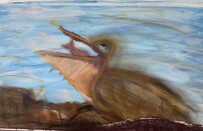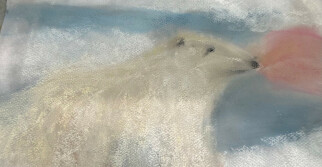April 21, 2024 | Rev. Loren McGrail

It’s Earth Sunday and our earth is a hot mess because of what we have done to it. While some folks will be learning about the deadly effects of plastic or the virtues of going solar or driving electric cars or at least hybrid cars, I would like to take us back to our creation stories---- about where we fit in God’s Good world. There are several creation stories in the Bible; they are found in the book of Genesis, Psalms, Proverbs, and the book of Job. Which story you find yourself in alignment with will indicate not only how you see the world but also what part you see yourself playing.
Most of us have grown up with the creation story in Genesis 1. We have grown accustomed to seeing ourselves created in God’s image and having “dominion over the fish of the sea and over the birds of the air and every living thing that moves upon the earth.” In this first story from Genesis, we humans, male and female, are created on the sixth and final day, after God had created everything else including the plants and animals.
This first story champions a Dominion Theology which means that humans are created to uniquely rule over the rest of creation. Religion Professor, Timothy Beal, in his book When Time is Short, goes even further, “Indeed, humankind is the reason for creation, whose purpose is to be used and enjoyed by it. It is the stage that humankind is to fulfill its divine calling to have God-like dominion.”
This, Dear Ones, is the bedrock for human exceptionalism even though God also blesses other living creatures and tells them to be fruitful and multiply. What we emphasize or hold onto is that we are to dominate or be good stewards of the earth.
Right after this first creation story in Genesis the text jumps to another story which is actually centuries older than the first and uses a different vocabulary for the divine creator and a different order which begins with a single human. The story does not begin with cosmic elements but with a verdant earth full of potential. The plants and grasses are waiting for the rain and a human to help them grow. Only then did God form ‘Ha’adam’, the human one, from the dust or the soil of the ground. Then God breathed into his nostrils, “the breath of life.”
Dear Ones, the first human, was connected to the fertile ground from which it is formed. ‘Ha’adam’ is literally connected to ‘ha’adamah’, the ground or humus. In this story of creation, we are earth creatures. God breathed earth and all its creatures became alive with the “breath of life.” Beal and others, point out that this sense of earth creatureliness allows us to have relationships with other beings as equals. This is far different from having dominion over or even good stewardship which is a softer form of dominion. In addition, in this creation story, the land’s permanence will stay long after our mortality has claimed us.
So, you are probably wondering why am I making such a fuss about these two different creation stories? And what does this have to do with Earth Sunday? The answer is everything. Dear Ones, we are living in the sixth extinction which is being brought about by those who are doing the extinguishing, us. We are also living in the era of the Anthropocene, a time in which human forces are having a huge impact on the planet’s ecological and geological systems. Some say this era started with the industrial revolution while others say the dawn of capitalism. And still others say it began around 1945 with first atomic bombs. No matter when it started what is true is that we humans are now the primary cause of great geological and ecological change including climate emergencies and even collapse beginning with extinction of species due to our behavior, actions, or inactions.
Dear Ones, it is essential, therefore, that we rethink and refeel who we are in connection to this world we live in, God’s Good creation. Beal says there are three movements that we must go through to reshape our relationship to this world and our place in it. The first is to face the reality of our delusional sense of godlike exceptionalism brought on by seeing ourselves as created in God’s image as thus meaning to have dominion over others; the second is to allow ourselves to grieve and lament over the losses of species---human and nonhuman and the disastrous climate catastrophes that are displacing and killing people; and then to move towards hope, “palliative hope” which allows us to prioritize our quality of life over the quantity of days. The spiritual challenge is to face our collective mortality as part of our story, part of what it means to be human.
For this, Dear Ones, we need our second creation story, the one that helps us to see that we are from this sacred muddy earth---that we share the breath of life with many others. This is why I shared an excerpt from the essay, You are an Icon by Laura Hicks Hardy. Hardy examines her relationship to a brown pelican who had been extinct and then brought back as a way to understand her own reactions. Her essay moves from talking about why the pelican went extinct and how the EPA stopped using DDT which allowed the pelicans to lay eggs again.
She notes that our actions were part of their endangerment and their survival. And then she does something I think we all must do; she examines her own spiritual needs and need to dominate. Listen again to her words:
I worry that only seeing these birds as an image of repentance or hope does a certain violence to them---am I still trying to dominate these pelicans? Here, for understanding, my need to know that these birds, whose strange flight I rely on to my anxieties, will survive. Even my own creative efforts—writing about these birds, praying them, seeing them well---bear marks of my limited and often self-centered humanness.
Dear Ones, though are sacred texts about creation and our place in it and interpretations that have placed us as exceptional have taken us to this drastic ledge, I, along with other theologians and thinkers, believe new interpretations of these texts can also help us imagine new possibilities of interconnectedness. There are things we all can do to help us become more resistant and resilient to the changes coming. However, the most important one is seeing how we are all one body and how harm to one is harm to all. We are all part of the web of life. Let’s start here today this Earth Sunday.

